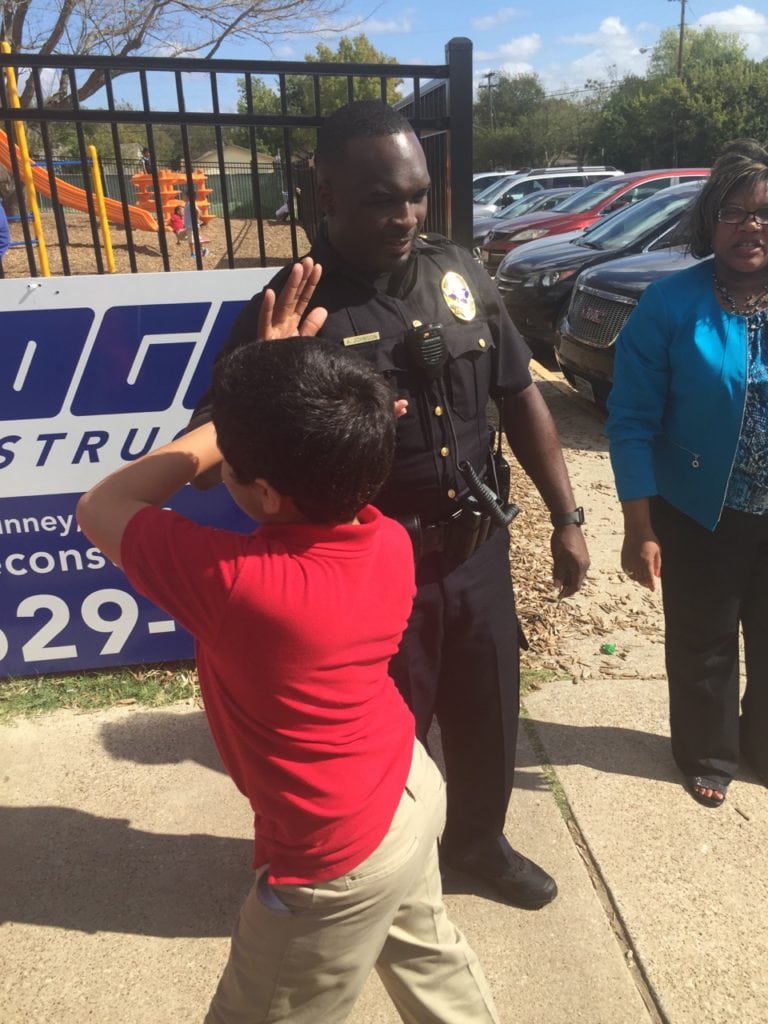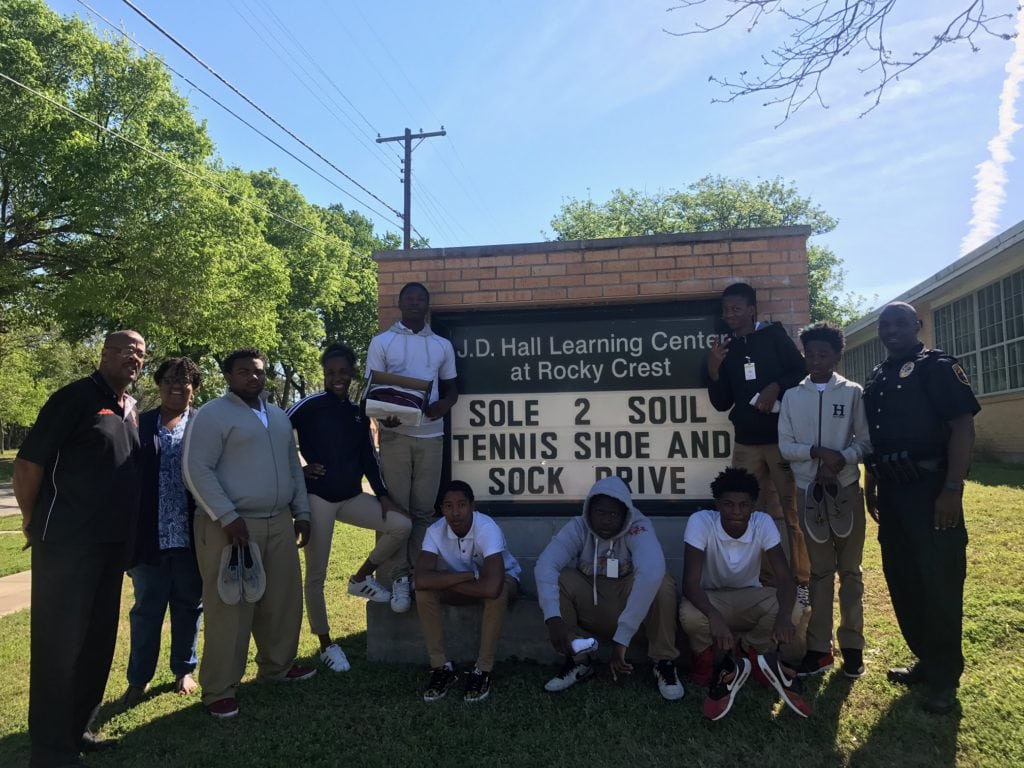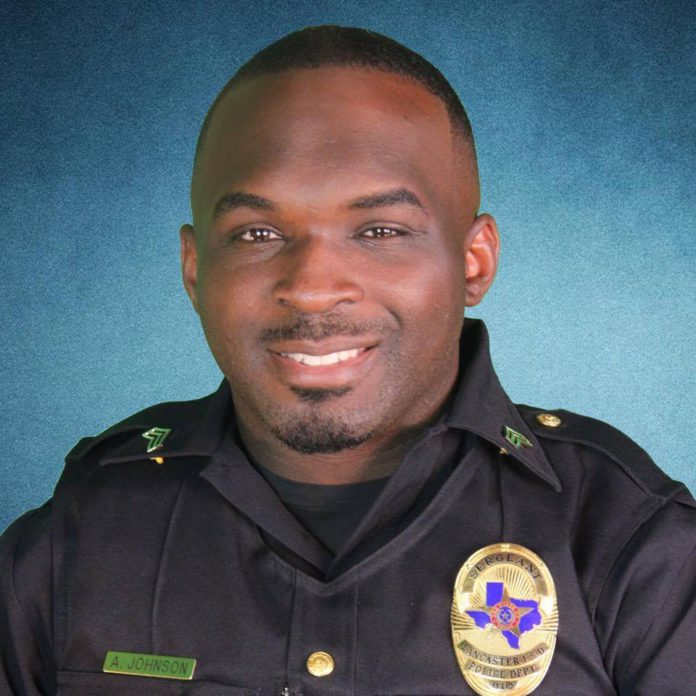Lancaster ISD Police Officer Impacts North Texas Youth
LANCASTER—In an era where tensions between minorities and law enforcement are at an all time high; one Lancaster Independent School District police officer sees a silver lining. While he is not a traditional educator, Sergeant Alvin Johnson takes advantage of these ‘teachable moments.’
With each heart wrenching headline depicting excessive police force or the brutal hunting of law enforcement, Sergeant Johnson takes the opportunity to teach North Texas youth on how to respond in these life or death situations.
“I try to educate those who don’t know,” said Johnson. “The unfortunate reality is that [as an African American police officer] I see both sides. This is difficult to do sometimes when the situation can easily apply to you or someone you love.”
These opportunities come on the heels of recent high profile deaths of black men, women and children at the hands of police. By the same token, the malicious killing of law enforcement officials in the line of duty sparks outrage as well.
Events like the police shooting 15-year-old Jordan Edwards last Sunday in Balch Springs is nothing new to Sgt. Johnson.
“My initial reaction was that of sadness, frustration and a state of disbelief about the entire situation.
Since then Officer Roy Oliver has been fired. But family and community members are still calling for more action, departmental transparency and police reform.

Impacting Local Youth
Sergeant Johnson has served as a School Resource Officer (SRO) on campuses all over Lancaster. He spends most of his time at Lancaster High School and the Alternative Education Campus.
After six years on the job, students often seek him out when similar events occur.
“Anytime we have a trending topi,c they find me and ask me: ‘Officer Johnson what do you think about this situation?’
Just like with adults, Johnson uses the ‘What If” tool.
“I tell them it very well could have been you. What would you have done in this situation?” he recalls. “I try to get them to think.”
As the Black Lives Matters vs Blue Lives Matter movements continue to gain steam, Sgt. Johnson simply advocates unity. No life is of greater value than another.
“Of course Black Lives Matter. The reality of it is that all lives matter. We all have one common goal – to be whole.” He said. “But I took that concept and created my own movement. It simply says that we are one. We are one community. We are one people. That developed as a result of me trying to bridge the gap between law enforcement and youth.”

Bridging The Gap
African-American officers comprise about 12 percent of some 470,000 police officers in more than 12,000 local departments across the country, according to the Federal Bureau of Justice Statistics.
In 2013, there were reportedly about 58,000 black officers in the U.S. Experts believe has remained relatively unchanged in the last few years.
For African American police officers across the country, putting on the shield means that they are putting themselves in the middle of a cultural crossfire.
“You definitely get push back from other officers sometimes. Then again, you get push-back from other groups of African-Americans who don’t know you,” explains Johnson. “All they know see is that you wear a badge.”
Despite the rotating video clips of violent protestors seen on the nightly news, Johnson says most of the people he comes in contact with just want to be heard.
“The bulk of what I do is let them vent,” he said. “A lot of time that is just what people want. They want some type of response or answers. Then, once they are done with their anger, we go into the ‘What If?’ situation.”
The “What If” situation is a tool that Johnson uses to allow disgruntled parties to put themselves in the opposite perspective.
“A lot of times, a light bulb would go off in their heads and they would say, ‘Hey I see that. I don’t agree with it. But I understand.”
And Johnson says that understanding goes a long way.
“So, when you are able to have these dialogues, it helps to bridge the gap.”
Molding Future Officers
These impromptu seminars have been going on in Lancaster ISD halls before the state legislature enacted Senate Bill 30 requiring conduct training for students during civilian/law enforcement scenarios.
“I would say that this is my favorite aspect of my job,” said Johnson. “Just being able to interact with the youth and trying to keep this from happening to them goes a long way.”
And it’s working. Insomuch that one Mesquite Horn senior wants to follow in Johnson’s footsteps.
“He’s impacted my life in several different ways,” says 17-year-old Quincy Chambers. “Not just on the criminal justice side of things but in personal things as well. Everyone needs a strong male role model in their lives.”
Chambers says he wants to be a school resource officer just like Sgt. Johnson. He is already a member of the Explorers Program at the Mesquite Police Department. During his off duty time Chambers takes part in the Mesquite Horn chapter of the Crime Stoppers, doing community service.
“My relationship with him has been pretty good. I have always been able to talk to him about anything that I am going through, says Chambers. “If I didn’t have Sgt. Johnson in my life I would probably look at law enforcement a whole lot differently.”














